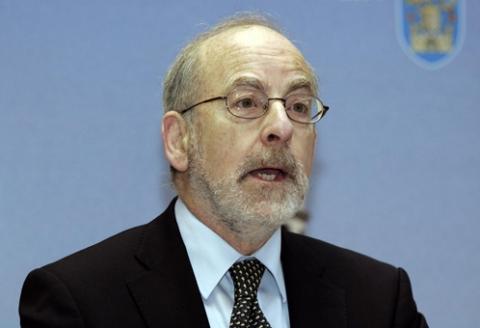Cowen put competitiveness before compliance for banks

Honohan's report casts light on the reasons for our banking crisis. Seventy-five percent of these reasons are internal factors. By Vincent Browne.
Following the Dirt tax inquiry, which revealed criminal fraud in the banks in the 1990s - naturally, nobody was ever prosecuted or even interviewed by gardaí - there was a proposal that directors of financial institutions be required to sign an annual statement confirming their compliance with their duties as directors.
This eventually became part of the law in 2004, and it gave the Financial Regulator the power to formulate the nature of such statements.
(Picture: Patrick Honohan, author of 'The Irish Banking Crisis – Regulatory and Financial Stability Policy, 2003-2008')
This might have gone some way in keeping directors of financial institutions on the straight and narrow, and might have at least mitigated the financial disaster that ensued.
In November 2004, the Financial Regulator prepared a consultation paper on directors’ compliance statements, which was circulated informally in the financial services sector.
The consultation paper noted the importance of such statements in fostering ‘‘a culture of compliance by developing a greater sense of accountability and responsibility among company directors and by developing good systems of internal controls within companies so that directors could commit themselves to compliance in good faith’’.
There was strong resistance to this proposal from the financial services industry - as you would expect - and it was even suggested that the proposed provisions of the compliance statements were unconstitutional.
But it was not only financial services hot-shots who were against this innovation that the Oireachtas had legislated for.
It emerges that, in November 2006, the Department of Finance - then under the stewardship of Brian Cowen - was also opposed to the implementation of the very provision which the Department of Finance had contrived to be part of the Central Bank Act in 2004.
In fact, the Department of Finance specifically requested the Financial Regulator not to proceed with even the consultation process on this issue without first discussing it with the department.
Arguably, this request was an entirely improper interference with the independence of the Financial Regulator.
And more was to come.
In December 2006, Cowen personally made it known that the Financial Regulator, in proceeding with this provision in an act of the Oireachtas, should assess the significance of this proposal in the context of competitiveness in the financial sector.
This was a further signal to the Financial Regulator not to proceed with the directors’ compliance statement initiative.
Then, following discussions with the Department of Finance, the Financial Regulator agreed not to implement the provisions as set out in the Central Bank Act.
Then what happened? Nothing.
The whole project was abandoned.
The directors of financial institutions were never required to give any undertaking to comply with reasonable rules of conduct in their office, and the ‘‘culture of compliance by developing a greater sense of accountability and responsibility among company directors’’ was never pursued.
Cowen was personally involved in scuttling that meagre assurance that bank directors would behave properly, and the bank directors went on to behave recklessly and irresponsibly, thereby inflicting massive damage on our society.
Cowen aided and then abetted them on the pretext of protecting the competitiveness of the financial institutions, a pretext that the Honohan report found was ‘‘overstated considerably’’.
I have not made all of this up - it is set out in stark terms in the superb report by Patrick Honohan on the banking crisis.
(For those interested, the bit about directors’ compliance statements is on pages 48 to 53, and the bit about competitiveness on pages 107-110.)
The report finds that Cowen - it doesn’t name him, but he was the guy with the brief - made a comprehensive mess of managing the economy from 2004 onwards.
He ignored, for instance, clear warnings from the Financial Regulator in pre-budget letters, notably prior to his first budget, for 2005.
The report makes the point that three quarters of the collapse of the Irish economy is attributable to local factors, which puts paid to the Lehman Brothers alibi. The report also makes it clear that there were clear signs that the banks were headed towards a crisis, while Cowen did nothing.
No other person is more responsible for the crisis than he is, and it is clear that a very large majority of the Irish electorate thinks the same, given the recent opinion poll findings.
He apparently thinks it is his duty to stay on and put right the mess he created.
It doesn’t occur to him, apparently, that he is a liability and that his very perseverance in office is an obstacle to the recovery.
There is an additional point: isn’t it essential that he be required to give a full account in public, at a forum where he is required to answer questions on why he took the decisions he did and, specifically, why he helped to frustrate the efforts of the Financial Regulator in bringing accountability to the running of our financial institutions?
